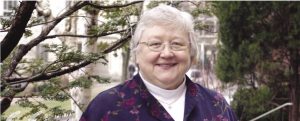ABSTRACT
 Although she denies it, Sister Elizabeth Davis, a member of the Congregation of the Sisters of Mercy of Newfoundland and Labrador, is becoming a Canadian icon: in education, in healthcare, in leadership development, in social policy and in religious studies, in Canada and abroad. With teaching appointments and participation on many boards and commissions, she leaves a trail of wisdom, quiet successes and vocal fans in her wake. In 2001, she won the Catholic Health Care Association of Canada’s Performance Citation Award and the Canadian Healthcare Association’s Award for Excellence in Distinguished Service. Those were followed by an Honorary Doctor of Laws from Memorial University of Newfoundland, induction into the Alpha Sigma Nu Honour Society of Jesuit Educational Institutions and an appointment as a Member of the Order of Canada in 2004. Recently, the University of Toronto’s Department of Health Policy, Management and Evaluation selected Sister Elizabeth as Leader of the Year for 2006. Ken Tremblay caught up with Sister Elizabeth at St. Augustine’s Seminary in Toronto, where she is currently teaching a course titled Introduction to the Old Testament.
Although she denies it, Sister Elizabeth Davis, a member of the Congregation of the Sisters of Mercy of Newfoundland and Labrador, is becoming a Canadian icon: in education, in healthcare, in leadership development, in social policy and in religious studies, in Canada and abroad. With teaching appointments and participation on many boards and commissions, she leaves a trail of wisdom, quiet successes and vocal fans in her wake. In 2001, she won the Catholic Health Care Association of Canada’s Performance Citation Award and the Canadian Healthcare Association’s Award for Excellence in Distinguished Service. Those were followed by an Honorary Doctor of Laws from Memorial University of Newfoundland, induction into the Alpha Sigma Nu Honour Society of Jesuit Educational Institutions and an appointment as a Member of the Order of Canada in 2004. Recently, the University of Toronto’s Department of Health Policy, Management and Evaluation selected Sister Elizabeth as Leader of the Year for 2006. Ken Tremblay caught up with Sister Elizabeth at St. Augustine’s Seminary in Toronto, where she is currently teaching a course titled Introduction to the Old Testament.HQ: Sister, your life with the Sisters of Mercy has been anything but traditional. From early roots in education, to healthcare leadership, to lifelong learning and doctoral studies, from small-town Newfoundland to international venues, from issues in contemporary society to religious studies of the Old Testament, from shaping minds to shaping policy and planning the future of a province, conversations with your general superior must be interesting?Sister: [Chuckle] To say the least! The sisters have been very supportive of me and my career. They have congratulated me on many occasions, and they constantly challenge me to do more. You might think that they would say “stick to the knitting” and stop wandering. They have recognized that these vocational changes have been important to me. I have been very fortunate to have accumulated these experiences and been grounded in their diversity.
HQ: What has been your proudest moment?
Sister: Actually, I have never thought of that. I guess, in a paradoxical way, it was the experience in St. John’s. Here we were, arguably in Canada’s poorest province, making significant changes in the way we delivered care. Staff in 10 different organizations joined me in making the decisions that were in the best interest of healthcare, and they put those needs ahead of their own interests – the unions, physicians, staff members, managers, volunteers, board members. Witnessing that degree of commitment – people putting aside their personal interests in the best interest of the community, during a very difficult time – was witnessing a triumph of the human spirit. I was proud to be counted among them.
Author: Ken Tremblay. Source: Healthcare Quarterly 10(1) January 2007 : 30-32.doi:10.12927/hcq..18646
Read the complete article here (PDF)


